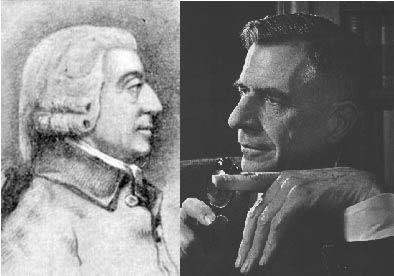It is a far, far better thing to have a firm anchor in nonsense than to put out on the troubled sea of thought.--J.K.Galbraith

Lately I have had an interest in economics. This interest has brought me to J.K.Galbraith and Adam Smith.
Today’s world seems more and more brutally governed by economics in a fashion that has little regard for morals or civic duty. From what I have been reading of John Kenneth Galbraith, he is a man that has conscientiously attempted to connect economics to the people it effects. Galbraith has distain for the others involved in his chosen profession and regards those that follow the "conventional wisdom"(a phrase he coined)as perpetuating in a myth. Galbraith views people who believe the market still functions much the same as the classical Smithian idea as perpetuating a dangerous myth and perpetrating a fraud over others.
I also sought out the bible of all economists "Wealth of Nations" but currently have no real desire to go through the complete text. The treatise on the socially beneficial effects of self-interest is the sacred text of all neo-liberal, modern-globalisation, and conventional wisdom adherents. Adam Smith is their adopted deity. Smith’s name and “Wealth of Nations”regularly spew forth from the mouths of all defenders of the neo-liberal faith in their defense of the effectiveness of markets and their desire for freer trade. 99% of these people, like me, have never made an effort to actually read the whole of Smith's work, and they never make any mention of the only other book he wrote.
While I haven't made an effort to dig into the “Wealth of Nations” I have been reading about his other work "A Theory of Moral Sentiments"(TMS). I am reading a critical reassessment of TMS by Leonidas Montes. Montes reassessment is an attempt to understand Smith’s less famous work not from a literal standpoint polluted with current modern thought, but rather a historical, contextual understanding of what Smith was likely thinking by understanding how he was influenced. From what I have read so far, I understand that in TMS, Smith lays out Self-command, prudence, justice and beneficence as moral virtues. These virtues are very similar to older greek virtues which Smith was certainly aware of. Montes’ viewpoint on Smith does not seem to generate the purely self-interested character that the neo-libs would have you believe Smith championed.
Montes points to Smith words in TMS VI.ii.3.3p.235,
"The wise and virtuous man is at all times willing that his own private interest should be sacrificed to the public interest of his own particular order or society. He is at all times willing, too, that the interest of this order or society should be sacrificed to the greater interest of the state or sovereignty, of which it is only a subordinate part. He should, therefore, be equally willing that all those inferior interests should be sacrificed to the greater interest of the universe, to the interest of that great society of all sensible and intelligent beings, of which God himself is the immediate administrator and director."
I doubt any neo-lib will have those words of Smith's grace his tongue.
Galbraith I believe would have been a good friend of Smith. Galbraith has great moral sense and takes a practical view of markets and their limitations. He as most economists applauds Smith's analysis of the functioning of markets and the role of self-interest being beneficial to society. However, Galbraith (as perhaps Smith would likely feel today) does not view today's corporate-controlled marketplace as having any semblance to the classical market idea that Smith was writing about over 200 years ago. The invisible hand of Smith has changed its form from the impartial actor that it once was. The invisible attribute no longer denotes the impartiality of this hand but rather the invisibility of the prevalence of manipulation of the market and the wilful ignorance of those followers of conventional wisdom.
If only Smith were alive to see today and how “Wealth of Nations” is viewed, used and abused today.
I implore anyone to read some Galbraith. 96 years old and still writing. Most can only wish.
www.johnkennethgalbraith.com
watch a panel discussion on galbraith
Montes reassessment
A review of Montes
A review of another book which deals with the "the Das Adam Smith Problem" (reconciling TMS with WN)

0 Comments:
Post a Comment
<< Home